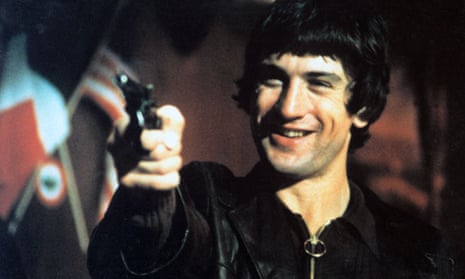Sin and shame are the driving forces of Martin Scorsese’s blistering early classic from 1973, now on rerelease for its 50th anniversary; it is an ultraviolent urban pastoral boiling up from the streets of Little Italy in Lower Manhattan around the time of the annual San Gennaro feast. It’s a thrillingly sensual, dangerous, effortlessly fluent movie which reaches back to the Warner Brothers’ gangster films, but also to Fellini’s I Vitelloni (1953), Godard’s Breathless (1960) and even the Boulting brothers’ Brighton Rock (1948). One year before, Francis Ford Coppola had released his sensational mob drama The Godfather, the great top-down grand political narrative of organised crime. Mean Streets is a great example of the opposite tradition: the ordinary worm’s-eye-view of the mafia, which was to lead to Scorsese’s GoodFellas and David Chase’s The Sopranos, stories of low-rankers and their day-to-day lives.
At its centre is Charlie (played by Harvey Keitel): a fledgling mob enforcer, nephew of much-feared middle-aged mafioso Giovanni (Cesare Danova), a first-generation Italian immigrant who has a cool, priestly authority over the younger man. Charlie is possibly about to be made the manager of a restaurant whose original owner has defaulted on a mob debt; Charlie is a snappy dresser, as befits his future importance as a man of honour; and his piety and brooding obsession with St Francis, punishment and hell have earned him the nickname “Saint Charles”.
It is of course Charlie to whom Scorsese (and co-writer Mardik Martin) give the now legendary opening voiceover monologue about sin: “You don’t make up for your sins in church. You do it in the streets. You do it at home. The rest is bullshit …” Another viewing of this movie reveals afresh what he means: sin is analogous to debt, and all around this film is the ethos of debt and the self-fulfilling prophecy of debt unpayment. The unforgiven sin is the unpaid debt and both lead only one way: death.
Charlie hangs out aimlessly with all sorts of boorish, racist lowlifes: Tony (David Proval) owns the bar which is HQ for all sorts of gang dealings (though his ownership is assumed to be contingent on mob permission), Michael (Richard Romanus) is a loan shark and thief, and Joey (George Memmoli) owns a pool hall and is himself involved in betting on numbers. In one uproarious scene, Charlie leads a menacing deputation to Joey’s establishment to collect winnings owing to a friend, a visit that explodes into an extraordinary fight with broken pool cues. Scorsese himself has an unsettling cameo as Jimmy Shorts, a malign courtier of Michael’s.
But the most unsavoury and pathetic of all these people is young Johnny Boy, gloriously played by a livewire Robert De Niro, a crazy and irresponsible kid who annoys everyone, especially the glowering Michael to whom he owes $3,000. It is only Johnny’s friendship with Charlie that has – so far – protected him from being beaten up or murdered, and Charlie has a sentimental protective attachment to this kid from the neighbourhood. He has no actual Christ-like intention of taking Johnny’s debt-sins on his own back, but this infuriating, grinning Johnny clearly thinks that his buddy Charlie will get his all-powerful gangster uncle to order Michael to forgive the debt. Moreover, Charlie is secretly dating Johnny Boy’s cousin Teresa (Amy Robinson), of whom Giovanni disapproves due to her poignantly concealed condition of epilepsy. And there is a nasty hint of blackmail as Johnny Boy hints he could, if he chose, tell Giovanni about this relationship.
Scene follows scene and setpiece follows setpiece with miraculous, frictionless ease, and there is a casual brilliance in the teeming festival streetscape scenes. Scorsese’s soundtrack use of pop and rock classics supercharges every image with sensual tragic power. Extraordinary things happen out of nowhere: Tony, for example, reveals that he is keeping a panther in a cage in the bar’s backroom. Why? How? We never know. When some drunk guy (a cameo for David Carradine) appears to insult connected guy Mario (Victor Argo) in the same bar, a young nephew (Robert Carradine) follows the man into the men’s room and empties his revolver into him; it is a surreally chaotic, sordid and apparently unpunished act which melts into the air as the terrified drinkers scatter out of the bar before the cops show up. But importantly Giovanni decrees that if this kid can be spirited away to Miami he will smooth out the whole thing, which reinforces Johnny Boy’s dangerous belief that Giovanni and Charlie will bail him out in the end.
In the end, what applies the film’s branding iron to your memory are the faces: Johnny Boy, Tony, Michael, Joey, Teresa, grinning, scowling, pleading in the darkness. They are hardly every shown in daylight. After any viewing of Mean Streets, this gallery of faces is what I see when I close my eyes.
